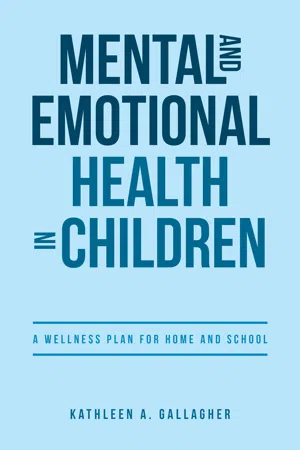
eBook - ePub
Mental and Emotional Health in Children
A Wellness Plan for Home and School
Kathleen A. Gallagher
This is a test
Compartir libro
- 72 páginas
- English
- ePUB (apto para móviles)
- Disponible en iOS y Android
eBook - ePub
Mental and Emotional Health in Children
A Wellness Plan for Home and School
Kathleen A. Gallagher
Detalles del libro
Vista previa del libro
Índice
Citas
Información del libro
Mental and Emotional Health in Children by Kathleen A. Gallagher
__________________________________
Preguntas frecuentes
¿Cómo cancelo mi suscripción?
¿Cómo descargo los libros?
Por el momento, todos nuestros libros ePub adaptables a dispositivos móviles se pueden descargar a través de la aplicación. La mayor parte de nuestros PDF también se puede descargar y ya estamos trabajando para que el resto también sea descargable. Obtén más información aquí.
¿En qué se diferencian los planes de precios?
Ambos planes te permiten acceder por completo a la biblioteca y a todas las funciones de Perlego. Las únicas diferencias son el precio y el período de suscripción: con el plan anual ahorrarás en torno a un 30 % en comparación con 12 meses de un plan mensual.
¿Qué es Perlego?
Somos un servicio de suscripción de libros de texto en línea que te permite acceder a toda una biblioteca en línea por menos de lo que cuesta un libro al mes. Con más de un millón de libros sobre más de 1000 categorías, ¡tenemos todo lo que necesitas! Obtén más información aquí.
¿Perlego ofrece la función de texto a voz?
Busca el símbolo de lectura en voz alta en tu próximo libro para ver si puedes escucharlo. La herramienta de lectura en voz alta lee el texto en voz alta por ti, resaltando el texto a medida que se lee. Puedes pausarla, acelerarla y ralentizarla. Obtén más información aquí.
¿Es Mental and Emotional Health in Children un PDF/ePUB en línea?
Sí, puedes acceder a Mental and Emotional Health in Children de Kathleen A. Gallagher en formato PDF o ePUB, así como a otros libros populares de Didattica y Gestione comportamentale. Tenemos más de un millón de libros disponibles en nuestro catálogo para que explores.
Información
Categoría
DidatticaCategoría
Gestione comportamentaleChapter 4
Discussions with Children on Handling Emotions
Purpose of Discussions
We teach skills for living by a process of simply listening to how others handle situations. We may think children should know better at certain times, but they do not unless they have been taught. Children act the way they have seen others act. And children act the way they feel unless they have learned other options.
When Discussions Are Used
In school, use a small-group time similar to a reading or math session with six to eight children sitting in a circle or around a table. At home, it can be a conversation at mealtime, while sitting in the den, playing a game, sitting with a child who is doing homework, or when getting ready for bed. It will work even with one child. In school, the discussion will take no more than ten minutes.
The Process
- Select a topic from the list provided below.
- Explain the procedure with such words as, “Today’s lesson is about the feeling of anger. Feelings are our friends. They tell us what we like and dislike, whom to choose as friends and whom to stay away from. I’ll mention one thing I do when I feel angry, and then each one of you can say something you do when you’re angry, or it’s okay to say, ‘I pass.’ Give each person your attention when it’s their turn because they deserve that respect. It’s okay for you to speak or not speak. No one has to talk. Let’s not laugh at what anyone says because you know how you would feel being laughed at.”
- In school, children from healthier homes will pass along healthy information. Children from less healthy homes will receive new information to broaden their perspectives.
- As you start off the discussion, share one of your own ideas or one of the suggestions offered below on that topic.
- Do not ask children to volunteer responses. Introverted or fearful children will not volunteer. When the group takes turns in order, more children usually take a turn.
- Do not use children’s names. After one child has spoken or passed, just say, “okay, next.”
- The teacher is the facilitator. Do not interact with any student no matter how wise or bizarre their comment may be.
- Let the group hear all the expressed options and form personal opinions about what has been revealed.
- At the end, the teacher (facilitator) does not prioritize the value of any comment given.
Topics for Discussion
The teacher takes the first turn and then says to the child beside her, “Okay, your turn.” Try not to start with the same child each time.
Dealing with anger: What can you do when you feel angry at someone?
- If you can, say to the person, “I feel angry when you say that or do that.”
- Walk away from the person or situation. Maybe the person is having a bad day.
- Tell a friend or an adult what you are angry about.
- Ride your bike or take a run.
- Stop and think before you do anything. You’ll feel bad if you hurt someone back.
- Tell yourself some things you are grateful for.
- Go and do something you like to do.
- It’s okay to feel angry. ...